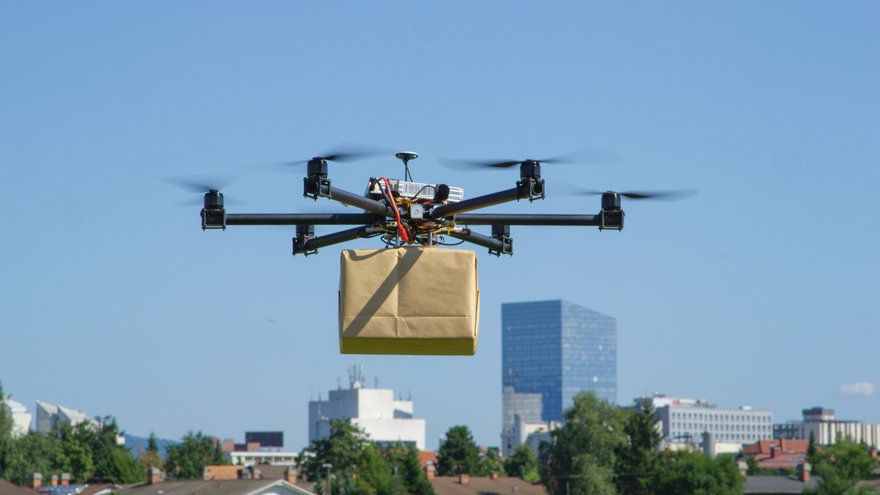From military applications to amateur photography, drones are growing in popularity, and drone stocks are consequently flying onto investors' radars. But it's not only publicly traded manufacturers that provide investors with an opportunity that affords exposure to drones. Exchange-traded funds also are a viable option.
Exchange-Traded Fund (ETF)
Let's take a look at some of the leading drone investment opportunities to see which are best for individual investors.

Best drone stocks
Best drone stocks to buy now
Drone technology continues to improve, and new applications for uncrewed vehicles -- such as food delivery -- are continually being explored. The U.S. Department of Defense, for example, is currently investigating the development of uncrewed vehicles that use artificial intelligence (AI) through its Replicator initiative.
Investors have a wide variety of stocks to consider when looking for exposure to drones. While they may be unable to invest in leading recreational drone companies, like DJI (a privately held company), there are plenty of drone stocks for investors to consider. Let's look at some of the most promising options: AeroVironment (AVAV 1.57%), Boeing (BA 0.25%), and Northrop Grumman (NOC -1.56%).
1. AeroVironment
With a market capitalization of about $3.6 billion, AeroVironment is smaller than larger defense companies, like Boeing and Northrop Grumman, that manufacture drones. However, it's an essential consideration for people who want concentrated drone exposure.
A pure play on drones, AeroVironment provides autonomous military vehicles (both ground-based and aerial) to the U.S. government and more than 55 other countries. The company is also focused on non-military applications.
AeroVironment is developing its high-altitude, solar-powered drone, Sunglider, to help provide broadband access. The company also partnered with NASA on Ingenuity, which NASA lauds as "the first aircraft to achieve powered, controlled flight on another planet."
While it may be smaller than some of its peers, the company is coming off a big performance in 2023. Booking sales of $541 million, AeroVironment saw its top line grow 21% year over year.
The company also saw impressive growth on its cash flow statement; cash from operations grew from negative $9.6 million in 2022 to $11.4 million in 2023. AeroVironment seems well positioned for future growth, leaving 2023 with a company record of $422 million in funded backlog.
People who count themselves as fans of Cathie Wood will also be attracted to AeroVironment since the stock is one of the largest holdings in the ARK Autonomous Technology & Robotics ETF (ARKQ 2.52%) and the ARK Space Exploration & Innovation ETF (ARKX 3.13%).
2. Boeing
The largest aerospace and defense stock based on market cap, Boeing may be most recognizable for its manufacturing of commercial aircraft, but the company is also a leader in uncrewed vehicles. As an industrial stalwart, Boeing is well suited for more conservative investors less interested in exposing themselves to risk.
Boeing has drones suited for a variety of settings. The company has two uncrewed maritime vehicles: the Wave Glider, which operates on the ocean's surface, and the Echo Voyager, an underwater autonomous vehicle that can operate for months at a time.
In the wild blue yonder, Boeing is developing the MQ-25, an uncrewed aerial refueling vehicle. In 2024, Boeing expects to complete the construction of a $200 million facility in St. Louis that will support the production of the MQ-25. The vehicles are expected to begin operations in 2026.
In addition to the MQ-25, Boeing is developing the MQ-28. An uncrewed fighter jet, the MQ-28 incorporates AI and has a range of more than 2,000 nautical miles. Extending into the final frontier, Boeing has also developed the X-37B, an uncrewed vehicle that operates in low Earth orbit and is capable of flights lasting as long as 270 days.
After a turbulent couple of years, Boeing seemed to get back on track in 2022. After failing to generate positive free cash flow from 2019 through 2021, Boeing reported free cash flow of $2.3 billion in 2022 (Its fourth-quarter results for 2023 weren't expected until Jan. 30).
3. Northrop Grumman
Similar to Boeing, Northrop Grumman is a large defense contractor, although its drone offerings are more sizable. Plus, it offers investors the ability to generate some passive income with an investment.
Northrop Grumman manufactures the MQ-4C Triton, used by the United States and Australia to conduct reconnaissance operations over oceans and coastal areas. Capable of 24-hour continuous missions, the Triton has a flight range of 8,200 nautical miles.
The RQ-4 Global Hawk, on the other hand, can operate continuously for more than 30 hours. It has logged more than 320,000 hours of flight time since it commenced its operations in 2001 for the U.S. Air Force.
Depending on its use -- reconnaissance, target acquisition, or communications relay -- Northrop Grumman's Bat drones can be fitted with different fuel tanks and sensors. Rounding out the drones found in the company's drone fleet are the MQ-8B Fire Scout and the NATO Alliance Ground Surveillance (AGS).
Northrop Grumman characterizes the Fire Scout as the U.S. "Navy's next-generation autonomous helicopter." It has completed more than 16,600 hours in flight and is capable of autonomous takeoff and landing from ships and landing zones. The NATO AGS is a high-altitude, long-endurance uncrewed vehicle that 15 NATO forces operate to share intelligence with other NATO allies.
Northrop Grumman will be especially appealing for drone investors also dedicated to finding dividend stocks. The company has raised its distribution for 21 consecutive years and currently offers a 1.5% dividend yield.
Drone ETF options
Drone ETFs
For drone investors looking for the broad exposure that exchange-traded funds (ETFs) provide, there are a few worthwhile options.
- iShares U.S. Aerospace & Defense ETF (ITA 0.4%): One of the largest defense ETFs available to investors, with $5.9 billion in assets under management as of Jan. 12, 2024, the ETF counts RTX (RTX -0.29%) and Boeing as its two largest holdings, each representing about a 17.4% weighting. The ETF has a moderately low expense ratio of 0.4%.
- ARK Autonomous Technology & Robotics ETF: This Cathie Wood option is an ideal choice for drone investors looking to balance the conservative nature of an ETF with the potential for growth. In addition to AeroVironment, the ETF includes Kratos Defense & Security Solutions (KTOS 9.12%), a leading drone manufacturer, among its top holdings. This ETF has a 0.75% expense ratio.
- The SPDR S&P Aerospace & Defense ETF (XAR 1.12%) is another compelling industrials ETF option with drone exposure. The ETF has 34 holdings, but there are several drone stocks among the top 10 largest positions, including RTX, Boeing, L3Harris (LHX 3.46%) -- a designer of uncrewed vehicles for air and sea -- and Textron (TXT 1.9%), which produces drones for air- and sea-based operations. The ETF has $1.9 billion in assets under management and an expense ratio of 0.35%.
Investing in drone stocks
Investing in drone stocks
Increasingly, militaries around the world are embracing drone technology. Consequently, many aerospace and defense companies are making concerted efforts to develop drone technology that can be used in defense applications.
Related investing topics
Investors who recognize this trend may be interested in landing drone stocks in their portfolios. AeroVironment, for example, is a great option for investors comfortable with slightly more risk, yet looking for growth opportunities. Boeing and Northrop Grumman, on the other hand, are industrial stalwarts that may be better options -- in addition to drone ETFs -- for those looking to mitigate risk.
FAQ
Drone stock FAQ
Which drone stock is best?
It's impossible to say broadly which drone stock is categorically the best. Instead, before deciding which drone stock is best for them, investors must consider various factors, such as risk tolerance, investing time horizons, and interest in generating passive income.
Are there any publicly traded drone companies?
Yes, there are several drone companies available to investors. Some are pure-play drone stocks, like AeroVironment; others, like Boeing and Northrop Grumman, have more diverse exposure.
How can I invest in drone technology?
Investors wanting direct exposure to drones may choose to invest in an individual company, while people looking to mitigate risk may be more interested in an ETF that includes drone stocks among its holdings.
Which is the most successful drone company?
It's hard to identify the single most successful drone company. With regard to recreational applications, many people recognize DJI as a dominant drone maker. When it comes to military applications, however, Boeing, Northrop Grumman, and AeroVironment are leading manufacturers.














